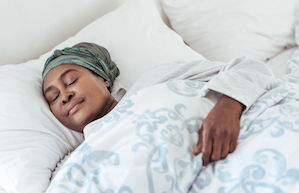Mental health experts are sounding the alarm: the COVID-19 pandemic has caused a serious spike in depression and anxiety, and the numbers continue to climb. One knock-on effect of the global trauma is that we’re sleeping less – or, sometimes, more but worse – which is both a symptom and a cause of many mental health disorders.
What do the global studies say?
One study from China found very high rates (20%) of ‘clinically significant’ insomnia (trouble falling or staying asleep) from early to mid-February 2020, when COVID-19 infections in this country were at their peak.
In the United States, Express Scripts reported that the number of prescriptions filled for sleep disorders shot up by 15% from February to March this year.
And we know South Africans are struggling, too. According to a recent survey by the South African Depression and Anxiety Group (SADAG), 55% of us are experiencing anxiety. Depression is at 40%.
The link between anxiety, depression and insomnia
Anxiety, depression and insomnia set off a vicious cycle: the first two conditions increase the likelihood of the third but, as scientists from the Haukeland University Hospital in Norway discovered, insomnia is also a risk factor and early warning sign of anxiety and depression.
While those with anxiety might struggle for hours to fall asleep, depression tends to cause light, restless sleep and frequent waking.
Apart from counting the hours (which doesn’t indicate the quality), how can you tell whether or not you’re getting enough decent sleep?
5 signs you need more sleep
You're hungrier than normal
Scientists have found that sleep deprivation increases certain brain chemicals – similar to a compound in marijuana – which makes you crave junk foods. We also know that too little sleep increases ghrelin (a hormone that makes you feel hungrier) and decreases leptin (a hormone that regulates your appetite and energy expenditure). So if you’re frequently hankering for a snack, you might not be getting enough sleep.
Your brain feels foggy
Even just a little less sleep (or just a little more late-night Netflix) can make it more difficult to focus on – and remember – details. As with many of the signs of a lack of sleep, this can also be a symptom of stress.
You find yourself withdrawing from others
In 2018, researchers from the University of California at Berkeley found that the less you sleep, the more physical distance you need from others. If you find yourself feeling withdrawn or reclusive, even after months of lockdown, it might be a sign you need more quality rest.
You have one of these chronic conditions
People who don’t get enough sleep over the long term are more likely to have high blood pressure, diabetes and narrowed blood vessels. Not only are these conditions possible signs that you need more sleep than you’re getting, they’re also ‘co-morbidities’ for COVID-19, which means they increase your risk of severe coronavirus infection.
You’re quick to snap
It might seem obvious, but several studies have also definitively proven that not getting enough sleep leads to irritability, anger and feelings of overwhelm.
How to take your sleep seriously and get the rest you need
You’ve likely heard similar ‘sleep hygiene’ advice before but, practised consistently, these habits really do work to improve your sleep.
· Go to sleep and wake up at the same times every day.
· Limit your screen time in the evenings (no devices in the bedroom!).
· Cut down on caffeine and alcohol.
· Exercise regularly (but at least four hours before bedtime).
· Manage your stress by meditating, practising mindfulness or journaling.
If you’re still struggling to get enough rest, seek professional help. Ongoing insomnia can badly affect both your physical and mental health, so it’s important to treat is as the serious condition it is.
The South African Depression and Anxiety Group offers a range of free support and resources. Phone 0800 456 789 (24 hours) or WhatsApp 076 882 2775.
IMAGE CREDIT: 123rf.com

